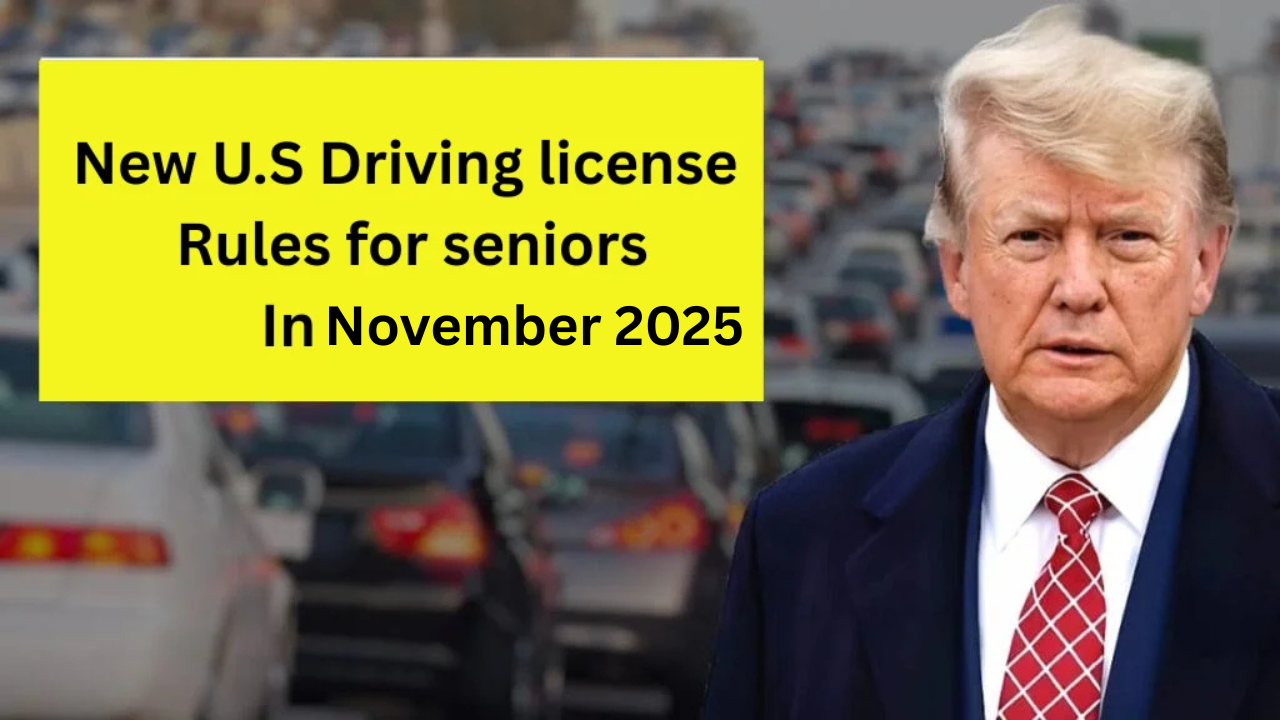New U.S. Driving License Rule:A major change is coming for older drivers across the United States. Beginning in November 2025, a new federal guideline for senior driver’s licenses will officially take effect, impacting the renewal, testing, and maintenance of driver’s licenses for citizens age 70 and older.
Introduced in partnership with the Department of Transportation (DOT) and individual state DMVs, this update aims to improve road safety and ensure that older Americans can continue driving independently, safely, and confidently for as long as possible.
Here’s what you need to know about the new senior driver’s license rule, its impact on renewal, and what steps seniors should take to remain compliant.
US $4,983 Direct Deposit in November 2025 for Everyone – Check Eligibility & Payment Date
Why the Rule is Changing
The senior population in the United States is growing rapidly, and millions of citizens over the age of 70 still drive daily. However, aging can affect vision, alertness, and reaction time, which are crucial for safe driving.
In response, the new rule ensures drivers remain competent while driving, while also providing resources, testing options, and renewal flexibility specifically designed for seniors.
Officials say its purpose is not to restrict independence, but to promote confidence, safety, and improved awareness on the road.
Key Changes Effective November 2025
Here are the main updates seniors should expect when renewing or applying for their driver’s licenses after November 2025:
-
Mandatory In-Person Renewal at Age 70 and Older
-
Seniors aged 70+ will be required to renew their licenses in person at the DMV.
-
This ensures a face-to-face vision and health screening to verify fitness to drive.
-
However, in some states, remote renewal may still be allowed for limited extensions in special cases (like medical hardship).
-
-
Updated Vision & Reaction Tests
-
The new rule includes a standardized vision test and, in some states, a brief reaction-time assessment.
-
Drivers will need to demonstrate adequate peripheral vision, response speed, and awareness.
-
-
Shorter License Validity Periods
-
Licenses for seniors 70 and above will now be valid for 4 years instead of 8 years in most states.
-
This ensures regular health and ability reviews.
-
-
Medical Self-Reporting Requirement
-
Applicants must disclose any new medical conditions that could affect driving, such as vision impairment, seizures, or memory decline.
-
Failure to report may lead to penalties or license suspension if discovered later.
-
-
Option for Voluntary Driving Assessments
-
Seniors can take certified driving courses or evaluations to maintain good-standing licenses and possible insurance discounts.
-
How to Prepare for the New Rule
If you’re 70 or older (or approaching that age), here’s how to prepare before your next renewal:
- Check your state’s DMV website to confirm the implementation date and local requirements.
- Book your renewal appointment early — there may be delays at the DMV when the rule first goes into effect.
- Get your eyes checked and have your prescription lenses updated if needed.
- Review your medications, as some can affect reaction time or the ability to concentrate.
- Consider a defensive driving course — it can hone your skills and lower your insurance rates.
State Flexibility and Waivers
Although federal guidelines set a national standard, states maintain some flexibility. For example:
- Florida and Arizona already have age-based renewal rules in place, requiring vision testing starting at age 80.
- California will conform to the new national standards but will allow online testing for seniors.
- Texas is launching mobile DMV vans to make in-person renewal easier for seniors in rural areas.
Each state’s DMV will post updates by October 2025, so seniors should check their local rules before visiting the office.
The Goal: Safety and Freedom Together
Transportation officials emphasize that this new rule is based on a balance – maintaining safety without compromising freedom.
Most senior citizens are responsible drivers with decades of experience, but these changes aim to recognize early warning signs that might otherwise go unnoticed, preventing potential accidents and ensuring everyone on the road stays safe.
Driving symbolizes independence for millions of older Americans – and the new system aims to preserve that freedom responsibly.
Frequently Asked Questions (FAQs)
1. When does the new rule take effect?
The rule officially takes effect on November 1, 2025, across all U.S. states and territories.
2. Who needs to renew in person?
Drivers aged 70 and older must renew their driver’s licenses in person at a DMV office.
3. Will there be any new tests?
Yes. Seniors will undergo a vision test and, in some states, a reaction or cognitive screening to ensure safe driving ability.
4. What if I fail the vision or reaction test?
You may be required to provide a doctor’s clearance or pass an additional driving assessment before your license is renewed.
5. Can I renew online if I’m over 70?
Generally, no. However, exceptions may apply in certain states for those with verified medical conditions or mobility issues.
6. Will this rule affect existing licenses?
Current licenses remain valid until their expiration date. The new requirements apply at your next renewal after November 2025.
7. Why are these changes necessary?
The updates aim to reduce senior-related road accidents and help older drivers stay confident and capable behind the wheel.
Alaska’s 2025 PFD $1,702 Stimulus Checks Confirmed for Eligible Residents

